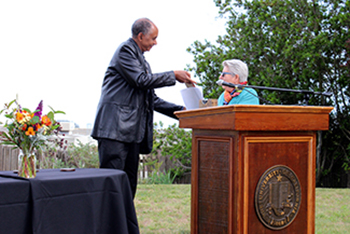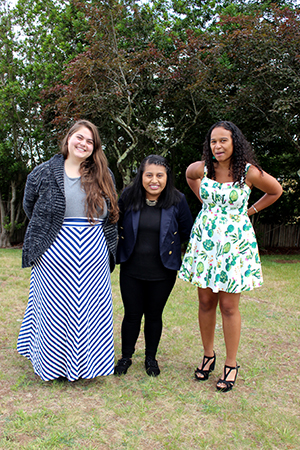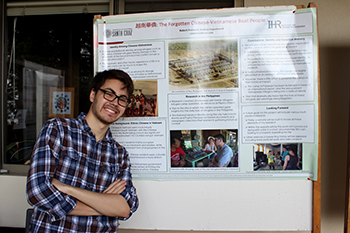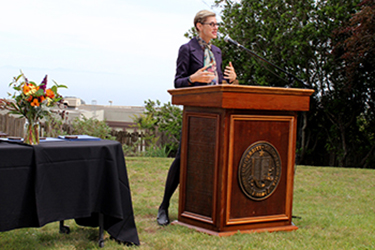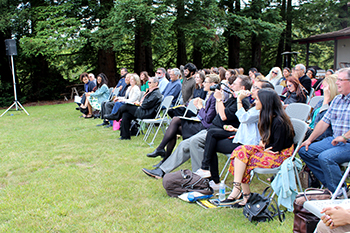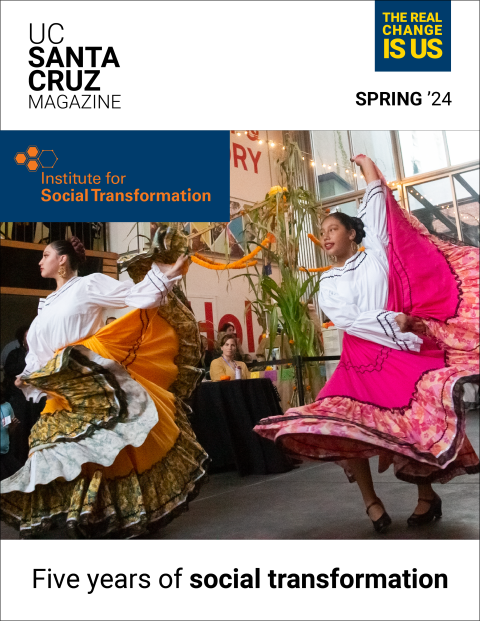Distinguished Professor of Feminist Studies Bettina Aptheker was presented with the John Dizikes Teaching Award in Humanities at the Humanities Division’s 2017 Spring Awards celebration held at the Cowell Provost House.
Established in 2002, the annual award is named in honor of emeritus professor John Dizikes, one of UC Santa Cruz’s founding faculty members. It is designed to celebrate the Humanities faculty’s commitment to excellence in teaching and its transformative impact on undergraduate students.
“Bettina Aptheker is truly an icon on this campus,” noted humanities dean Tyler Stovall in his introduction. “She has always exemplified everything UC Santa Cruz is, and should be.”
Recently named as the inaugural chair of the new Peggy and Jack Baskin Foundation Presidential Chair for Feminist Studies, Aptheker has taught one of the country’s largest and most influential introductory feminist studies courses to more than 10,000 students during her 37 years as a faculty member at UC Santa Cruz.
“I invite everyone--regardless of who they are or where they come from--to look critically and fully at their lives,” said Aptheker about her teaching philosophy. “It’s not so much what they think; I just want them to think.”
In addition to being honored with a check for $3,000, the faculty winner is also entitled to select an undergraduate student to receive a $3,000 scholarship. Aptheker chose to split the prize between three senior graduating students in feminist studies—Mayra Contreras, Abyan Mama-Farah, and Lara Losel.
"Being in this institution as a woman of color, there were times where I just wanted to run away and head back to Los Angeles,” said Contreras. “I felt like I wasn’t good enough to be here and that I was better off at home. I want to thank Bettina for believing in me and inspiring me to continue my education.”
“My parents and my sisters have all sacrificed something for me to be here,” she added. “I also want to thank Bettina for valuing my parents’ lives and their struggles, and for making me feel like my parents’ history matters."
A double major in feminist studies and biology, Abyan Mama-Farah told the audience she is planning to pursue a career in medicine.
“As a student of both biology and feminist studies, feminist studies has served as a refuge intellectually and provided a wonderful community of talented, critical thinkers who inspire me each and every day to keep working,” said Mama-Farah.
“It has also helped me grapple with the deep, ethical questions that are inherently embedded in the doing and making of science,” she added.
The 2017 Humanities Spring Awards event began with opening remarks by new UC Santa Cruz campus provost and executive vice chancellor, Marlene Tromp, who comes to the campus with an extensive background in the humanities.
“I’m really proud to be a humanist at a place that cares about humanists’ work, Tromp noted. “I think humanists do some of the most important work that is happening culturally now.”
“Humanists are reshaping the way we understand social justice out in the world,” she added. “The decisions we make now have long term effects, and humanists will be, and should be, a big part of those decisions.”
